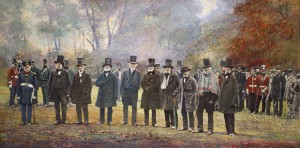
Back in the early days of the American Republic, a social tradition existed which provided a way to save face and address personal disputes honorably: the duel. When one gentleman’s honor was insulted by another gentleman, the two might agree to face each other with pistols on an open field and settle the matter. Even if both men missed their target, the duel would end honorably and both gentlemen would be exonerated of dishonor.
In the years leading up to 1812, the United States faced an affront to its national honor. This affront manifested itself in many forms: impressment of American sailors, British trade restrictions and the British military presence in the Northwest (Great Lakes). Americans tried to cope with these grievances by enacting trade embargoes and launching military campaigns against Native Americans in the Northwest. In the case of the latter, the result was limited in regards to Great Britain, in the case of the former, the result was disastrous for the commercial interests of the United States itself.
The United States found itself unable to defend the security of her sailors on the High Seas, unable to defend her free trade, even unable to defend her frontier. This was an insult to a nation on the fringe of the respected international community. Henry Clay, at that time Speaker of the House, advocated war as an honor-preserving measure. As an interesting aside, I find it intriguing and eerily prophetic of the cultural polarization of North and South, that the honor-mindful Southern and Western states were enthusiastic about the war, while the pragmatic, commercial Northeastern states were violent critics of the war.
There is still considerable debate who won the War of 1812, if anyone did. I believe that the most appropriate way to describe the result of the War of 1812 is a duel between countries, in which both “miss” their mark like the feuding gentlemen mentioned above but both exit the dueling field with heads held high and honor intact.
America’s national pride and honor have the War of 1812 to thank, in great part. Honor was insulted, threats were communicated, a duel was organized, shots were exchanged, peace was made and honor was redeemed. That is the story of the War of 1812 in a nutshell.
